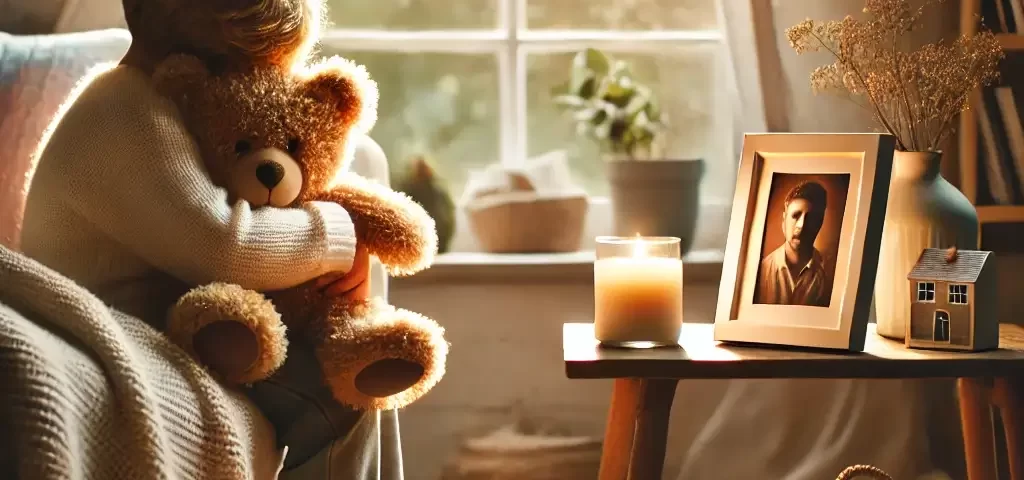Impact of Losing a Parent on Children

Helping Children Memorialize Loved Ones
January 5, 2025
Navigating Funeral Costs in New Jersey: Insights and Tips for Families
February 9, 2025A parental death changes everything for a child, be it from emotional, to psychological and developmental changes. Losing a parent for a child is not merely a loss, it is a life changing phenomenon that shapes up one’s life course. In the United States, 1 in every 12 children, while in the United Kingdom, 5% of children lose their parents before attaining adult years. Understanding this loss and its consequences as early as possible is critical to bring these children through the process of grieving and enable them to build a secure and firm foundation for the future.
The Emotional Impact of Losing a Parent
Common Emotional Reactions
The emotional responses of losing a parent for a child include sadness, anger, confusion, and guilt. These feelings can be overwhelming in children and may not allow them to adjust properly to the changed situation. Such overwhelming emotions could extend into periods of depression, affecting the ability of a child to interact and to conduct the daily routines with ease.
Age-Specific Emotional Responses
Compared with teenagers, children under age 12 are particularly vulnerable to depression when a parent dies. Younger children may also regress in development and start to wet the bed or baby talk in order to express their confusion and emotional upset. For pre teens and teens, intense anger, withdrawal, and sometimes rebellion commonly accompany grief. Teenagers can further express risky behavior and rebellion due to crises from not being able to handle overwhelming feelings.
The Psychological Effects of Parental Loss
Long-Term Grief and Trauma
Losing a parent for a child can cause PTSD, depression, anxiety, and many other psychological effects. Research has shown that bereaved children develop PTSD more frequently than their non-bereaved ones. The loss most of the time leaves a void, which seems to stay for years, to be reminded during every major event in one’s life, whether it be graduation, marriage, or the birth of their children.
Impact on Mental Health Development
Most often, the loss of a parent is followed by changes in children’s emotional states, such as sleep disturbances, crying, emotional detachment, and various indicators of psychological disturbance. Unless properly addressed, such psychological outcomes might persist throughout adulthood, shaping mental health development and later giving rise to chronic problems, including low self esteem and problems in emotion regulation.
Coping Mechanisms in Children
Healthy vs. Unhealthy Coping Strategies
Children develop several faulty methods of coping with a situation which are avoidance, denial, of their feelings, which makes intensity of the grieving even worse. Generally, such methods lead to behavioral problems, including aggression and isolated behavior. The healthier options include writing in a journal, doing art therapy, and joining support groups, which are necessary to get the child to cope with their loss. Encouraging children to express their feelings through creative ways or interactions with peers may promote emotional resilience and prevent any long term psychological harm.
The Developmental Impact of Losing a Parent
Social Development Challenges
There are cases of bereaved children experiencing difficulties in social development. Losing a parent for a child often leads to poor relationship skills and trusting issues, further affecting the child’s interaction with others in society and future relationships. These might occur in the form of unwillingness to form a close friendship or fear of abandonment with existing ones.
Academic and Behavioral Changes
The bereaved children may start to perform below par in their studies because of poor concentration and lack of motivation. This may be observed by teachers because grades will be deteriorating, unfinished assignments, and lot of absences. The behavioral problems might also include acting out badly in school and house. Children might become awkward or withdrawn, which is a representation of inner chaos and poor handling of the situations.
Impact on Future Relationships
Unresolved grief of losing a parent for a child spills over into future relationships. Adults who experienced the loss of a loved parent during childhood often describe difficult times such as trying to form close, trusting relationships. The risk of repeating the loss of loved ones keeps them from engaging totally in romantic or platonic relationships.
Factors That Influence How Children Process Parental Loss
Support Systems
A supportive environment of family, friends, and even counseling can make all the difference in how children handle their loss. Grief therapy can be an opportunity for children to express themselves and get appropriate help to cope with their feelings. Teachers and community leaders can also pitch in with layers of added support by providing an atmosphere where the children feel recognized and appreciated, to understand more about how to help the child to cope with loss of a parent HonorYou provides a article which should be read “Helping Your Child Cope After a Loved One Passes Away”.
Age and Maturity
The age and maturity of the child are big factors in how he or she will deal with his or her loss. Younger children do not fully grasp the meaning of death. Many of them consistently believe it is temporary or reversible. For teenagers, however, the permanence of the loss can bring contemplation about life and, subsequently, greater emotion. Support should be provided according to the child’s developmental stage.

Cultural and Social Influences
Other conditions that may influence the children’s experience and expression of their grief are cultural practices and the expectations in society concerning grief. Where some cultures encourage open expressions of sorrow, others value restraint and stoicism. Understanding such influences provides a key toward culturally sensitive support. Participation in selected culturally relevant mourning rituals may provide a sense of closure and belonging for children.
How to Support a Child Who Has Lost a Parent
Providing Emotional Support
Losing a parent for a child is of course a stressful situation where the kid needs to be provided with emotional support, such help is all about creating an atmosphere where the talks would flow. Let the kid talk about his memories without being judgmental. Just listening to the kid and accepting his emotions will help tremendously. Keep reassuring him or her regularly, and also keep on providing stability during these hard times.
Professional Therapy and Counseling Options
Grief therapy has been found very helpful for children whose parents have died. Professional counselors can help them work their way through their feelings and find ways to deal with their loss. Therapy sessions that are targeted at their age and personality, can be very successful in addressing certain concerns and helping them with emotional healing.
Encouraging Healthy Coping Strategies
Losing a parent for a child could be a cause of many issues in a kid but activities like keeping a journal, art therapy, and support groups will allow the child to express their feelings and be comfortable. Group therapy, in which children meet and share with other children who have suffered similar losses, will make them not feel so alone. Physical activities like sport can be used to help create emotional stability and help the kid heal from the sorrow.
FAQs
1. What are the most common emotional effects of losing a parent for a child?
The most common emotional reactions are feelings of sadness, anger, confusion, guilt, depression, and anxiety. Behavioral problems and emotional withdrawal are common. Children may exhibit a different kind of emotions depending on their age.
2. How does losing a parent affect a child’s development?
Losing a parent for a child may develop problems or difficulties in social development, school performances, and even further relationships. It could also lead to increased vulnerability to other mental issues.
3. How can I support a grieving child at home?
One can provide emotional support to a grieving child by offering a safe space for expression and encouragement of healthy coping mechanisms. Presence, attention, and patience provide an space for the child to work through the grief process at his own pace
4. Is professional counseling necessary for children who lose a parent?
Professional counseling is highly recommended to enable the child to work through his or her feelings and build resilience. Therapy will provide structured support so the children do not have to feel like they are facing the bereavement alone.
5. How long does grief typically last for a child after losing a parent?
Grief can last for any length of time in a child. Although the intensity may diminish with time, the effects of losing a parent for a child can continue for several years and are evident during important stages of life. There is no end line in grief, and children might require support during different phases of their life.


